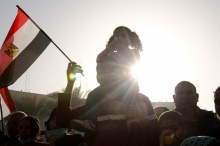Demanding democracy in Egypt

Public Services International leader Rosa Pavanelli says, “It is not a military putsch that removes a democratically elected president that will make it possible to restore freedom and democracy in Egypt. More democracy and respect for workers’ rights can be achieved only by heeding the millions of Egyptians who are demonstrating and demanding new elections so they can swiftly chart a better future for their society.”
“Good governance, rule of law and respect for human rights are crucial for equitable social and economic development. Workers’ rights must be upheld so the delivery of vital public services can be assured for the benefit of all. Building a healthy and more open society also requires the rising violence against women to be stopped, and that strong measures to ensure women’s participation in all levels of politics and the community are put into effect.”
The 2011 revolution brought greater awareness of basic labour rights, but Morsi’s government targeted union organisers and activists through repressive laws and violent actions. A new report by SOLIDAR highlights the challenges to union organising in Egypt and the region.
Freedom of Association under threat in Middle East and North Africa
The Arab Spring has fundamentally changed the political landscape of the Middle East and North Africa (MENA). But despite high expectations, after more than two years, the revolutions so far have been unable to produce consolidated and stable democracies and some countries are still facing ongoing turmoil. Despite significant changes, measures continue to limit the democratic space in the region.
For example, in Egypt under Morsi’s government, freedom of association came heavily under pressure with the proposal of a new, restrictive law on associations, the conviction of 43 NGO workers and the closure of five international NGOs. In Algeria, the new Law on Associations, adopted in 2012, fails to protect freedom of association by limiting access to foreign funding and complicating the registration of new and existing organisations.
SOLIDAR’s briefing paper “Freedom of Association Under Threat in Middle East and North Africa” analyses freedom of association and peaceful assembly, freedom of expression and information and democratic transition and civil dialogue in the region. It was produced following a consultation process to provide an opportunity for the organisations within the Network to comment on the Progress Reports on the implementation of the European Neighbourhood Policy 2013.
The responses to the consultation clearly indicate that in Palestine, Egypt, Lebanon, Jordan, Algeria, Tunisia and Morocco, worrying developments took place in 2012 and 2013 regarding the analysed benchmarks. These developments demand attention in the new Progress Reports and should be incorporated in all policy making that shapes the relations between the EU and the region.
Read all recommendations and the full briefing.
Read PSI statement "Demanding democracy in Egypt" in Arabic.
Read the statement from the Egyptian Federation for Independent Trade Unions (EFITU): English Arabic

